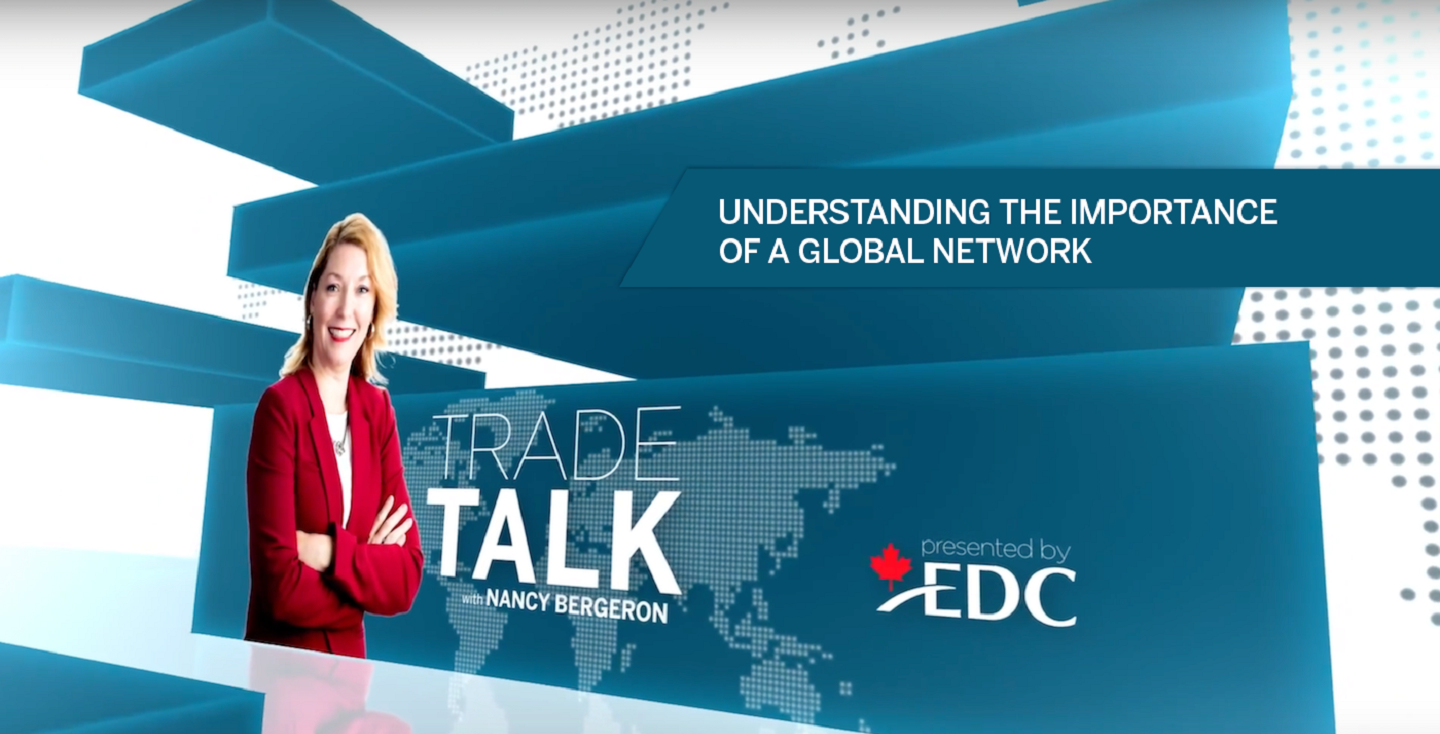
4 reasons skilled executives boost global competitive advantage
EDC’s 2017 survey of more than 700 Canadian companies found that 73% attributed their international business success to executives “committed to global growth”
MyEDC account
Manage your finance and insurance services. Get access to export tools and expert insights.
Solutions
By product
By product
By product
By product
Insurance
Get short-term coverage for occasional exports
Maintain ongoing coverage for active exporters

Learn how credit insurance safeguards your business and opens doors to new markets.

See how portfolio credit insurance helped this Canadian innovator expand.
Guarantees
Increase borrowing power for exports
Free up cash tied to contracts
Protect profits from exchange risk
Unlock more working capital

Find out how access to working capital fueled their expansion.
Loans
Secure a loan for global expansion
Get financing for international customers
Access funding for capital-intensive projects

Find out how direct lending helped this snack brand go global.

Learn how a Canadian tech firm turns sustainability into global opportunity.
Investments
Get equity capital for strategic growth

Explore how GoBolt built a greener logistics network across borders.
By industry
Featured

See how Canadian cleantech firms are advancing global sustainability goals.

Build relationships with global buyers to help grow your international business.
Resources
Popular topics
Explore strategies to enter new markets
Understand trade tariffs and how to manage their impact
Learn ways to protect your business from uncertainty
Build stronger supply chains for reliable operation
Access tools and insights for agri-food exporters
Find market intelligence for mining and metals exporters
Get insights to drive sustainable innovation
Explore resources for infrastructure growth
Export stage
Discover practical tools for first-time exporters
Unlock strategies to manage risk and boost growth
Leverage insights and connections to scale worldwide

Learn how pricing strategies help you enter new markets, manage risk and attract customers.

Get expert insights and the latest economic trends to help guide your export strategy.
Trade intelligence
Track trade trends in Indo-Pacific
Uncover European market opportunities
Access insights on U.S. trade
Browse countries and markets
Get expert analysis on markets and trends
Discover stories shaping global trade
See what’s ahead for the world economy
Monitor shifting global market risks
Read exporters’ perspectives on global trade
Knowledge centre
Get answers to your export questions
Research foreign companies before doing business
Find trusted freight forwarders
Gain export skills with online courses
Get insights and practical advice from leading experts
Listen to global trade stories
Learn how exporters are thriving worldwide
Explore export challenges and EDC solutions
Discover resources for smarter exporting
About
Discover our story
See how we help exporters
Explore the companies we serve
Learn about our commitment to ESG
Understand our governance framework
See the results of our commitments
MyEDC account
Manage your finance and insurance services. Get access to export tools and expert insights.

Having access to skilled talent is essential to being competitive in the global marketplace. Executives with an international vision are the first step to boosting your global competitive advantage. The right executives:
Finding people with the right skills and talents to fulfill your business goals is increasingly difficult. But the most competitive firms are those prioritizing human talent, by integrating talent management and recruitment into their business growth strategy:
Leading the pack is the executive team. Having skilled talent in the C-suite is the number-one differentiator between companies that compete successfully in global markets and those who don’t, according to EDC’s internal research.
EDC’s 2017 survey of more than 700 Canadian companies found that 73% attributed their international business success to executives “committed to global growth”
“Access to capital is no longer the number one constraint to growth or the key to competitiveness for Canadian companies,” says Bryan Bogensberger, associate director and executive fellow at the Lazaridis Institute for the Management of Technology Enterprises. “Access to executive talent is the single thing that allows companies in this country to scale up and be competitive internationally.”
Here are four reasons executive talent recruitment is essential to your global growth strategy.
“Successful international executives have a global view,” says Amy Karam, global strategy consultant.
As Karam explains, executives are the visionaries of a company. They know the big picture. Skilled executives understand their product or service offering inside and out. They see opportunities where others may not.
Have you heard of the dating website called Plenty of Fish? It was started by Vancouverite Marcus Frind in 2003 as a side gig on his computer. Within a year, with a monthly income of $200,000, Frind quit his job to travel the world with his laptop. After he made his first $10 million in revenue five years later and knew every aspect of code that underlined his offering, he hired others to help him manage his company and further its growth.
“Every successful company starts with a great product or service,” says global strategy consultant Mel Sauvé, owner of Global Growth. “Good executives understand their product or service offering is world-class, and not a me-too product. They have a vision and will do what they can to get that product into international markets.”
Risk is part of international business. Executives with an entrepreneurial flair tend to see risk as a positive force and are more likely to find new opportunities as a result.
“Executives realize that going global is critical to their success and they’re willing to do what it takes to get there,” says Sauvé.
One of the first steps to competing internationally is testing your product or service against others in the new market. You then must be willing to shift your business processes, if necessary, to meet demand of new clients. These are all high-risk activities.
“The competition is fierce internationally,” says Sauve. “Even if you have a great product for Canada, you need to be prepared to go out and test it against your top international competitors and adapt it to meet the needs of clients in specific markets. That means getting comfortable with risk.”
“Executives not only define strategy, but they must persuade others to work toward it,” says Kristelle Audet, director of the Global Commerce Centre, The Conference Board of Canada.
It’s not enough for an executive to make decisions. Executives must also strive to get buy-in from the people working for them, potential partners and investors. The most talented executives are transparent and able to communicate their growth vision in a persuasive way to stakeholders.
“We give our employees a really compelling vision of what they’re working on,” says Paul Lem, founder and CEO of Ottawa biotech firm, Spartan Bioscience. “We celebrate our incremental success so they can see directly that what they’re doing will improve the health of people all over the world. This is what drives them and keeps them loyal to the company and to our vision.”
Karam has worked for a number of international firms in Canada and the U.S. She recently published a book called The China Factor, which outlines many of the cultural nuances executives consider when trying to break into China and other Asian markets.
One of the best pieces of advice Karam offers to her clients is to cast the net wide when recruiting executives.
“Attracting talent from abroad or attracting talent that’s spent time abroad can make a big difference,” says Karam. “Having talent in the C-suite that has experienced different markets is really important in offering a reality check and giving validation or invalidation to a proposed market entry strategy.”
“You can be committed to going abroad, but unless the leader really understands the markets, the macro-economic dynamics, what it takes to close business from a customer relations experience, they’re going to fail even with the best intentions,” she adds.
If your firm doesn’t have people in the C-suite with international experience, don’t panic.
“What you do need more than anything is a willingness among the executive team to get out and make the calls in the international market, wherever that is, and find people who can give you the answers,” says Sauvé.
International or not, most skilled executives have a high-level of self-awareness that allows them to fill the talent gap.
“The best executives understand the strengths of the CEO and the strengths on their executive team. But they are also brutally honest about what they lack,” says Kim Morouney, managing director at the Lazaridis Institute. “Once they know what they lack, they go out there, find what they need and bring in people with skills that complement their existing team.”
Canadian companies compete for customers and talent with firms across the globe, regardless of whether they “choose” to operate business internationally. A number of factors are fueling this trend:
All these things have reduced barriers to the sale of goods and services and enhanced movement of skilled talent across borders.
Organizations are smaller, on average, than they were at the beginning of the century, meaning the average employee has to do more with less.
Workplaces rely on digital technology, requiring people with specialized skills to develop, enhance and apply technology.
Advanced automation has displaced many routine jobs, leaving the more complex and ambiguous work like strategy, problem-solving, innovating and communicating to the humans.
There is greater risk-taking required for success, as firms realize growth ambitions through digital technology and internationalization.

Part 2 of 3 in series
Part 3 of 3 in series
What employees want: How to compete for talentOur latest eBook offers strategies for recruiting the top-quality talent you need to sell successfully internationally.

Learn how an Asian food importer grew in Latin America through EDC support and private labels.

Discover how market diversification can enhance your export strategy and provide new ways for your business to grow in today’s uncertain trade climate.

After accessing EDC Portfolio Credit Insurance, the environmental company saw sales grow by 60% and now exports to every continent

This material handling company started out in a garage, but used EDC’s credit insurance and Business Connection Program to support its international growth and is now worth $35 million.

Learn how Wuxly Movement CEO, James Yurichuk, goes through a day leading the animal-free parka company.